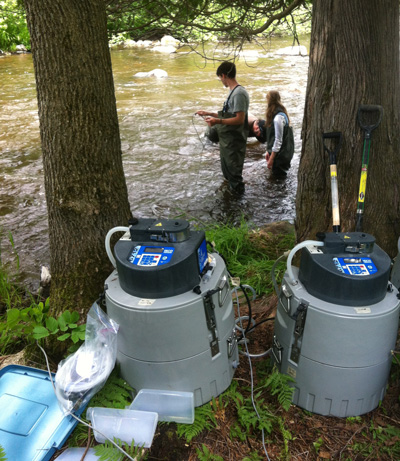These research themes represent a compilation of the achievements of our researchers. For example, they reflect the leading work of our Research Chairs including our Canada Research Chairs (CRC) as well as our Chair of Indigenous Education. The work of our Tri-Agency grant holders is also described below. Relatedly, cutting-edge research from our growing number of research labs and centres are also highlighted. In addition to applied research Nipissing also prides itself in recognizing significant research contributions made by its faculties in propagating fundamental research across the disciplines.
Broadly, these themes include the more recent and ongoing publication and project success happening across the disciplines. So, what is set out below is not an exhaustive accounting of all research but rather an effort to give a sense of our unique research profile as it appears across the institution as a whole.
Still, notable accomplishments in our individual departments should not go without mention. For example, the Fine Arts Department has produced award-winning sculptures, paintings, and drawings shown in galleries around the world. English Studies sustains research excellence in the areas of Canadian, British, and American literature and culture.
Areas of Achievement
Indigenous and Decolonial Research
In partnership with Indigenous peoples and groups, Nipissing researchers engage in a broad range of work using innovative methods and practices to better understand the deep history, culture and ideas of our region. For example, theoretically, settler accountability understood through the lens of decolonial and Indigenous scholarship participates in the larger effort at truth and reconciliation while practically, research on combatting human trafficking in Northeastern Ontario helps address fundamental challenges facing our communities.
With a new focus on community-based health promotion and Indigenous youth involvement in sport and physical activity, our researchers are understanding the impact on the lives of young people in the region. Researchers challenge current conceptualizations of health and colonized structures from a perspective centered on Indigenous knowledge systems. This work further extends to partnerships with Nipissing First Nation to better understand the impact of women’s collective and individual experiences and to explore the dynamics of memory making and storytelling. Also partnering with Dokis First Nation, our researchers chronicle the intrinsic link between contemporary land-use decision-making, traditional storytelling, and histories of colonialism.
Environment and Natural Resources

Researchers at our university understand that complex environmental challenges at the local and global scale can best be examined through multiple perspectives, and integration of Indigenous knowledge systems, natural sciences, social sciences, and humanities.
Nipissing University is therefore striving to become a model for interdisciplinary collaboration and critical research on the environment across disciplines, highlighting longstanding partnerships with Indigenous communities, government agencies, private industry, and non-profit organizations.
Scholars at our university come from different disciplinary traditions, including geography, history, anthropology, Indigenous studies, business, education, English, gender studies, political science, classics, and religion. Environmental issues are examined through a myriad of ways, including remote sensing, isotope analysis, archival and museum research, dendroprovenancing, policy analysis, Indigenous methodologies, oral histories, and ethnographies. For example, monitoring of Lake Nipissing including its water quality and forest and fisheries management as well as an isotope survey of the French River are among the ways our researchers make a regional contribution with national and global impact.
Nipissing University is one of the first institutions in Canada to offer a broad interdisciplinary graduate MES/MESc program that integrates the geophysical sciences, natural sciences, Indigenous studies, and the humanities. We challenge the new generation of environmental graduate students to equip them to deal with the complex histories of colonialism, resource development, and social science as part of the skills and knowledge necessary to conduct environmental research.
Over the last ten years, our researchers have made significant contributions at the international, national, and regional level ranging from environmental and cultural impacts of resource development in northern and tropical regions, water policy research, environmental history, decolonial and Indigenous methodologies, watershed modelling, forest science, and environmental monitoring.
Nipissing University researchers are actively involved in exploring the effects of ecological patterns in the distribution, composition, and productivity of plant communities in the forest. The study of ecological patterns could serve as a valuable tool for forest resource management, particularly to support the sustainable development of new forestry products in Northern Ontario. The regeneration of declining tree species in Ontario is also a topic of strong research interest among our researchers.
Many of our researchers also study the geographies and histories of the “near north” as a site for natural resource exploitation and colonial settlement. From both a social scientific and humanities perspective, our researchers have explored how the conceptualization of nature in this region has had an enduring influence on the geopolitical imagination of science and trade networks.
The Human Condition

Faculty members and students at Nipissing University conduct research that has critical implications for the health and well-being of people in northern and rural communities, including Indigenous communities, in Canada and around the world. Such health-related research spans a remarkable range of topics including eHealth, chronic disease prevention, nutritional interventions for at risk populations (e.g. Indigenous women), and physical activity promotion in cancer survivors and school-aged children. These researchers have developed strong collaborations with external partners such as the North Bay Parry Sound District Health Unit, Children’s Hospital of Eastern Ontario, Northeast Cancer Centre- Health Sciences North, and school boards across the region and province.
In addition, a multidisciplinary, collaborative group of Nipissing University faculty and students from our School of Business, School of Physical Education, and Departments of psychology, sociology, biology and chemistry use a variety of research methods and techniques to explore the factors that give rise to individual differences in behaviour. These techniques include survey-based methods, group social interactions, pharmacological challenge studies, quantitative behavioural assessments, and brain imaging tools. This research has made substantial contributions to our understanding of important psychological, behavioural, social and demographic processes including aggression and intrasexual competition, social identity and mental imagery among athletes and consumers, social anxiety, social communication of chemical alarm cues, learned helplessness, life-course transition, and family formation. It has been applied to areas of innovation and change management as the consumer experience and decisions made in the sport and tourism contexts and public policy.
Efforts are also being made towards the development of novel therapeutic agents for the treatment/prevention of degenerative diseases such as cancer and cardiovascular and neurodegenerative diseases.
Conflict Resolution
Nipissing University prides itself on its diverse research in the area of conflict resolution. Spanning disciplines and subjects that include human rights, the history and politics of the women’s movement as well as Indigenous justice and Aboriginal rights, our researchers have explored and critiqued a variety of approaches to mitigate conflict in local, national, and international settings.
Nipissing’s long history as a centre for educational research has led to leading work on how to incorporate conflict resolution into local classrooms and the provincial curriculum as well as university governance. Similarly, our nursing program continues to make a contribution to better practices in our hospitals and healthcare facilities across the province and country.
More recently, our researchers have developed expertise in the area of peace studies, including philosophical work on the concept of peace as well as new programming in the areas of international negotiations and alternative dispute resolution. There is a particular and growing interest in the relationship between collective and individual rights in relation to the development of new legal and political strategies to help marginalized people and groups.
Human rights researchers have also further weighed the impact of the Truth and Reconciliation Commission process and its place in comparison to similar global efforts.
Our research community has also engaged extensively with the local First Nations, developing multi-year research projects and disseminating knowledge in partnership with elders towards better local and national relations while identifying questions of Indigenous self-determination, sustainable communities, as well as the celebration of Indigenous knowledge and practices.
Consideration of environmental and bioethical rights is also at the fore of the struggle to overcome the influence of global warming and the introduction of new disruptive technologies. The historical impact of natural resource development by Canadian corporations at home and abroad is another important area of study. Relatedly, corporate responsibility, sustainable markets, and the need for ethical trade practices also has become a growing area of strength.
Inequality
Researchers at Nipissing University seek to explore, analyze, and critique the multiple sources and effects of inequality in Canadian and global society. Through the distinct lenses of philosophical, political, historical, sociological, and scientific approaches, Nipissing researchers have revealed important and surprising links between geographic place and education access, gender and economic opportunity as well as poverty and human rights.
Across many disciplines, our researchers have dedicated themselves to understanding ways to overcome and remedy these inequities and many others through the development of new means of data collection, innovative policy tools, and theoretical methods. Structural inequality in our post-secondary education system, the historical origins of class, the definition of poverty, the complicated persistence of human trafficking and ongoing efforts to achieve reconciliation with Indigenous peoples are among the multiyear research projects and publications advanced and produced at Nipissing University.
Reflecting Canada’s commitment to multiculturalism, our scholars have offered new ways to implement a diversity agenda in the classroom, the demographic and economic influence of new immigration policies, the tension between religion and secularity, and how music and art can celebrate cultural differences. Both the successes and challenges of multiculturalism have been brought to light through books, edited collections, articles and policy papers.
Along with contemplation and critique, we also seek real world solutions to problems associated with inequity, with a strong sense that our work can make a positive impact on our local environment as well as around the planet. Everything from measuring water quality, the effect of overfishing, deforestation, and urbanization provide concrete means and methods to lessen negative human impacts on the natural world. From the Ottawa River watershed, to the rain forests of Central America, to the fish-markets on the banks of Zambezi River in southern Africa, Nipissing researchers have laid the foundation for making real change at home and abroad.
Information Technology and Mathematical Sciences

Nipissing University is internationally recognized for its topology research cluster. Members of the cluster study general and geometric topology, functional analysis, dimension theory, continuum theory and dynamical systems.
Other Nipissing faculty members are conducting internationally recognized research across a broad spectrum of IT-related and quantitative fields of inquiry. Research areas in computer science, computational physics, and other computational disciplines include nanophotonics with applications in nanotechnology and nanomedicine, artificial neural networks, computational geometry, cryptography, deep machine learning, graph theory, optimization, image recognition, neural networks, robotics, signal analysis, and role-based collaborative systems.
In our School of Business, there is research on the use and impact of IT in buyer-supplier relationships, as well as quantitative research on applied multivariate modeling. Nipissing’s geographers focus on spatial data acquisition, analysis, and database management for urban and rural environments, using GIS, remote sensing, and spatial modeling, areas which also overlap with the second theme, above. Together with our topologists, this group puts Nipissing in a strong position to develop research excellence in spatial analysis and the study of large data sets.
